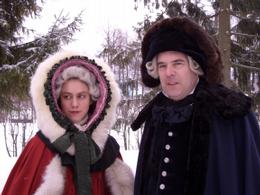

PBS’ Catherine the Great
Love period film and television? Want more on Catherine the Great than the 1995 version starring Catherine Zeta-Jones offered or the 1934 “Scarlett Empress”/Marlene Deitrich? Now actress Emily Bruni portrays the Empress in dramatic re-creations that include candid excerpts from Catherine’s own writings.
She was a teenage bride from an obscure German principality who went on to become perhaps the most influential ruler in Russian history. She was a student of the Enlightenment, yet never improved the miserable conditions of Russian serfs. She was the passionate advocate of education and the arts who created the renowned Hermitage collection—and a cunning political strategist who dramatically expanded Russia’s empire by annexing the Crimea and parts of Poland. She’s been the subject of debate, controversy, admiration and contempt, as well as of wild and unfounded rumors about her personal life, but the real story of Catherine the Great, Empress of Russia, is far more compelling than any fiction.
Now a two-hour PBS documentary illuminates the dynamic woman behind the lurid legend: Catherine the Great airs in two parts on PBS beginning Monday, May 8, 2006, 10 to11 p.m. ET (check local listings); Part 2 airs Monday, May 15, 2006, 10 to 11 p.m. ET (check local listings).
The special is produced by Brook Lapping Productions. The company’s three-hour documentary, “Exclusive Peace,” about the Israeli-Palestinian conflict, aired on PBS in October 2005. Catherine the Great was written, produced and directed by John-Paul Davidson (who directed the Michael Palin travel documentaries Sahara and Himalaya). Actress Emily Bruni portrays Catherine the Great in dramatic re-creations that humanize the near-mythic figure, and reads sometimes shockingly honest excerpts from Catherine’s own memoirs.
The woman who was to become one of the most influential rulers of Russia began life as Sophie Friedericke Auguste von Anhalt-Zerbst, daughter of a minor German prince. At age 14, Sophie and her mother, Johanna, were summoned to the Russian court by Empress Elizabeth, who had seized power in a coup and deposed the child czar, Ivan the Sixth. Elizabeth chose Sophie as the bride for her sickly, imbecilic nephew Peter III, her chosen successor.
Sophie, who viewed Elizabeth “as a goddess,” studied Russian and converted from Lutheranism to the Russian Orthodox faith, taking the name Catherine (or Ekaterina). She and Peter were married in 1745, when Catherine was 17 — but the marriage was not consummated for many years, due to Peter’s mental and physical shortcomings.
Catherine confessed in her memoirs that she felt indifferent toward her husband — but, she said, “I was not indifferent to the Russian throne.” She became an avid student of politics and of the Enlightenment, reading the works of Voltaire and Diderot. When Elizabeth died, Peter became czar — while Catherine was pregnant with the child of her lover, the war hero Grigory Orloff.
Peter, with his Prussian obsession and mental instability, quickly earned the enmity of Russia’s military. The soldiers were only too ready to support Catherine when she and Orloff, with his brother Alexei Orloff, overthrew Peter in the summer of 1762. Shortly afterwards, Peter was dead, murdered by Alexei Orloff. Catherine was the new, unchallenged Empress of Russia.
During her 34-year reign, Catherine instituted sweeping changes in Russia, transforming an impoverished, uncivil nation into a vast, sophisticated empire equal to any in Europe. She established schools and hospitals throughout the country—and even received one of the first smallpox inoculations to demonstrate the importance of modern science. With her longtime lover (and perhaps secret husband), Grigory Potemkin, Catherine achieved her goal of expanding Russia’s territory south to the Black Sea. She was famous for taking many lovers (who got younger as she got older), but always kept her own counsel and never relinquished her power to anyone. Possessing an unequalled and complex combination of intelligence, humanity, ruthlessness, political cunning and personal charm, Catherine was truly, in the words of author Simon Sebag Montefiori, “the greatest of Russia’s rulers, bar none.

